| This is a
very moving and disturbing article to read. But it is one that shows what kind of caring
and loving man Cat Stevens/Yusuf Islam was, and still is for that matter. This
article tells a story of the Cat Stevens that very few people knew. The man that donated
millions of dollars to Unicef yearly. This is his trek to Bangladesh, at Unicefs request,
to show him what his contributions were being used for. It is a very disturbing story of
what life is like in a very poor country like Bangladesh. I would like to thank George
L. Brown for contributing this extremely Rare Article from a Dutch - May
1979 Magazine. And a big thank you to Michael Valenzuela for taking the
time to translate this article into English for Majicat Stevens. There are quite a few
mistakes in the article, as you will notice ( these are not typographical mistakes, but
mistakes made by the author of the article.) But it is the heart of the story that truly
matters. _________________________________
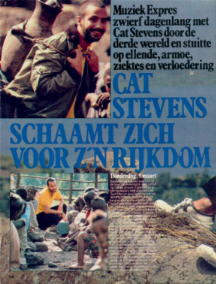
CAT STEVENS IS ASHAMED OF HIS
WEALTH
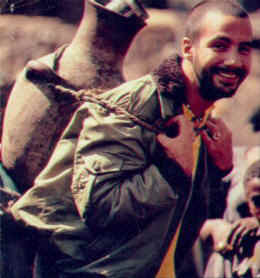 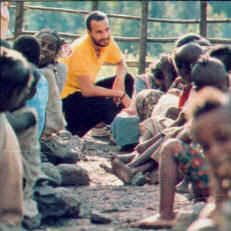
- In this land children are sometimes maimed on
purpose.
Music Express spends all day long with
Cat Stevens through the third world and encounters misery, poverty, sickness and crime. 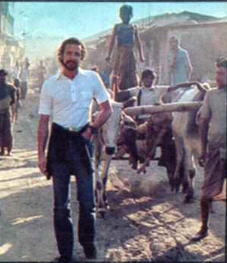
Thursday, 8 March
A Filthy warmth rises up our throats as
we finally set foot at Dacca Airport. Actually you can the scarcely mention an airfield.
Here there is a dilapidated cargo shed full of use as beggars make it their home. At the
arrival and departure halls there is nobody (from security) in proportion to the danger
then what we are used to in Europe or America. We were gathered by an agent of UNICEF.
Without too many problems he loaded us into a rickety taxi. Scarcely had we settled
ourselves in the back seat when the car went into motion. With the horn honking the
chauffeur brought us to the hotel.
Outside the building bore the traces of
the terrible war with Pakistan, a war that ultimately brought independent rule to
Bangladesh, but left behind a visible poverty as well. We were followed up to the stately
lobby by begging children. You'd want to give them all your money, but you know you can't
begin to do that. Cat made an exception for a lad without legs. The child was mobbed by
his partners, who had tried to steal the money from him. With the intervention from the
UNICEF agent the child was completely released. "I'll never do that again", Cat
said, whereupon he proceeded to his room, so that he wouldn't leave any more till the
following day arrived.
We were to be guided through the city.
We went lively in the direction of the market. It looked like we were long awaited heroes.
We were constantly tempted by dozens of children in ragged clothing. Some of them are
missing one or two arms, others had to do without legs. "Often it is no natural
deformity", our guide said. "In this land children are sometimes maimed on
purpose in order to get more money as a beggar". That sounds horrible, but with the
past completely in view, we gradually faced reality. Bitter poverty places new rules, no
matter how inhuman. We did not see smiling faces. Dim misery is drawn on everyone's face.
Cat Stevens shook his head not understanding. "I was prepared for the worst things,
but this beats all", he stammered. "You know that I am beginning to be ashamed
of my wealth".
Tuesday, 13 March
All five days we were confronted with
deep human misery. The total poverty became part of us. We grew dull, almost ignoring the
begging children as we past by. We can no more as we see someone on the street dying.
Chittagong was on our itinerary, the
most important port of Bangladesh. Life here is more agitated. There are also more demands
put on the people here. A day here means a minimum of 20 hours work. We did not have a lot
of time for us to look around here to make positive impressions. We were expected in
Rangamati towards the evening, a place where by manner of exception a cultural festival
will be held. In a jeep we passed by the mountainous landscape. Here and there we were
followed by children in tattered clothing. A cattle farmer looked not recognizing our
means of transportation. He could only just dream of such luxury. Rangamati looks a lot
like Chittagong. There's the same high life's tempo, while the hard work scarcely produces
pocket change. The cultural festival will be a friendly get-together of privileged
capitalists of Bangladesh. The arrival of the well known pop star Cat Stevens counts here
as a unique chance for them to taste even the luxury of the West. Big land owners,
politicians and foreign diplomats make up the audience. They were accompanied by their
wives, who outdid each other with such expensive dresses. A harsh contrast with the usual
population is scarcely conceivable.
Cat gave a brilliant concert.
Concentrating to the top of his fingers he sang away all of the misery from the past days.
At the conclusion he fetched Alun Davies, a lesser known pop great from America, to the
podium so they could sing some duets. With Al improvising, Cat gave voice to the poverty
of this corner of the world. However this song will not appear on record. "I don't
want people to say that I am making myself rich on the misery of other people." As he
once hands over the proceeds, he proposed, "In fact relatively little is left over
and there are again other people who are better for it. No, there are more ways to
help.", replied Stevens, and after that closed his silence.
Friday, 16 March
Through inquiries by the UNICEF deputy,
we learned that Cat Stevens donates yearly a quarter million dollars (around five-hundred
thousand guldens). "He is one of the most silent money givers", says our
informant. "To let him see for a time what happened to his money, we invited him for
a trip through Bangladesh. For the rest of you, Cat doesn't mind that you know it. He
wants you to keep the secret."
Today Patuakhalh is on the itinerary, a
fishing spot on the Gulf of Bengal. In comparison to the flatlands, here is talk of a
secure prosperity. The inhabitants can at least keep a reasonable livelihood. Naturally
here one must also struggle with malnourishment because of the singular food, but at least
there is food. Cat looks out for the pieces better than what had happened the previous
days. "Here you see at the least see something that resembles human livelihood,"
he explained. We decided to go fishing. It was extremely primitive, but still reasonably
efficient. Cat was carried on the shoulders enthusiastically by one of the local
politicians. "You brought us luck. For a long time we haven't caught anything."
To add extra strength to his gladness, he invited us for a drink at his house.
The man lived in a well maintained house
in an apparently prosperous district. Even here it apparently counts, that whoever sits
closest to the fire is best warmed. Confronted with the conclusion, the man acted with
great innocence. "From my political office I'm not one cent better off. What you see
here comes from family possessions. By chance I come from a well off family. But I don't
think that all politicians in this land are well off. I have acquaintances in Bhola that
live worse off , who live in a sort of upgraded hut. And the man counts himself as one of
the leading citizens of the village. Bangladesh is a young nation. Anyone here has the
same chances." We nod, but we are not able to believe his words. In the past days we
have seen too much misery.
Wednesday, March 21
After bumping around for hours in our
jeep, we arrive at Rangpur, a place in the northern most part of Bangladesh. Continually
drought leaves little of the harvest left. That means that the farming population will
have to plant the food anew. Men in these regions are accustomed to the further tightening
their belts. Until the absolute minimum is reached there is nothing left for thousands
than to starve. With hope for a better tomorrow the men work the fields again. Since they
are short with help from the rich West, the tools must be supplied. One of the goals , for
which UNICEF annually makes millions of guldens available. Rangpur is for that matter
privileged with respect to the surrounding areas, because here is housed a sort of model
farm. With modern means men try to begin the uneven struggle against nature. Step by step
man comes ever closer to the ultimate goal: a human existence for a population that too
long had to many blows. We were taken in as long awaited friends. We must still look at
primitive houses and accept gracefully all invitations to come over to eat, not that we
were afraid of food poisoning, but that we were convinced that our eventual meal together
would cause rationing for the following days.
On the spot Cat gave an open air
concert. The local people watched wide-eyed. They scarcely realized that one of the best
paid artists in the word is playing. Since over ninety percent of them could neither read
nor write, the meaning of Cat's text completely eludes them. Nevertheless they seem to
understand him as he played, because as Cat presented his special Bangladesh song to the
audience, he was rewarded with a resounding applause. Cat seemed happier than what we had
seen during the trip. Possibly he also came to realize that this simple concert at the
market place brought a little happiness to their dull existence.
Saturday, 24 March 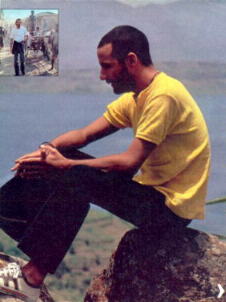
We are back in Dacca. We are newly
confronted with the dull misery of the overcrowded metropolis. In the hotel we talked
about what happened to us these past weeks. We came to the conclusion that, without the
help from the rich West, this land will not be rescued. And as well, a financial injection
is insufficient. Well educated construction workers must come to show the ropes to the
local farmers in the handling of the new tools. They must start school projects. They must
also build a hundred thousand houses to help anyone with a shelter fit for humans. As we
arrived that evening at the airport, we noticed in one of the sheds the child without
legs. Cat looked at him for a long time. He could not make a decision. He took out his
wallet and gave him a hand full of change. He just lifted up his eyes, then again there is
the disconsolate desolation in those brown eyes. On the steps to the plane, Cat said,
"I will never lose that sight."
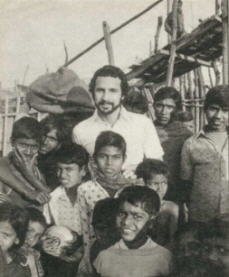
We were brought in like long lost
friends. Children seemed to be our biggest fans.
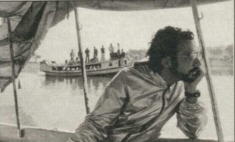
The misery in the slums of Dacca was
broken by a trip up the Brahmaputra.
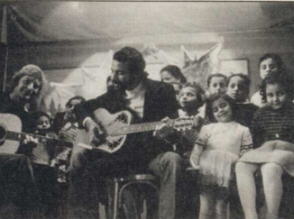
During the cultural festival in
Rangamuti, Cat and Alun Davies sing for the wealthy children.
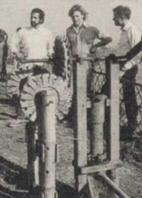 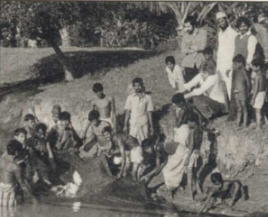
Rangpur enjoys a secure prosperity by the
fact that it hosts an experimental farm.
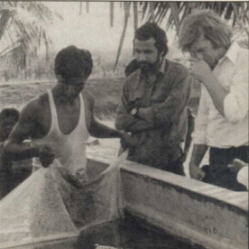
One of the fishermen controls his nets from
possible holes in a special tray . Cat and one of the officers from UNICEF look on with
interest.
Dutch version of this article is on Peter
Noorlanders Cat Stevens Website - Dutch Muziek Express 1979
|